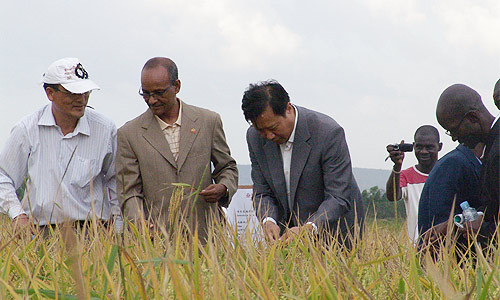|
 |
|
A FARMING MODEL: Zhang Guoqing (center), China's Ambassador to Mali, inspects a hybrid rice farm, developed with the assistance of Chinese agricultural experts, in the suburbs of the capital city Bamako on October 12, 2009 (XINHUA) |
According to a fact sheet released by the UN, the global ODA—which experts consider vital to achieving the MDGs on time in developing countries—for 2009 was $26 billion shy of the target. Presently, the funding gap on commitments to Africa, where a number of countries are drowned in deep debt to developed nations, is more than $16 billion.
Industrialized countries pledged to contribute 0.7 percent of their gross national income, but most of them have failed to keep their word. However, they continue to stress the need for good governance in countries that are in dire need of financial help to fight poverty.
The international humanitarian organization Action Aid's Joanna Kerr described the outcome document in these words: "They have promised everything to everyone, and nothing to no one."
South-South cooperation
A sense of frustration about the sluggish progress toward the MDGs was also evident among several civil activists from the Global Call to Action Against Poverty (GCAP), a network of civil society organizations in 130 countries.
Like many statesmen and women from the developing world, civil society representatives who attended the summit supported the idea of greater cooperation among countries of the developing South to end poverty.
"The North imposes the rules and the South must receive the aid," said a GCAP activist from Trinidad and Tobago. But new models of development, based on mutual cooperation and equal partnership, are springing up in areas of the South, such as Brazil, Malaysia, and China.
Adelaide Sosseh, Co-chair of the GCAP, held similar views about how to put an end to economic and social injustice in the world and achieve the MDGs on time.
"The South-South cooperation is the best approach," she said. "We should be acting together and trading together."
She praised China's initiatives to help a number of African nations in their efforts to achieve the MDGs. "China is a developing country," she said. "We need more partnership with China."
On the floor of the UN General Assembly, Chinese Premier Wen Jiabao told world leaders his nation was eager to support other developing countries, despite the fact that his government was still struggling to address socioeconomic difficulties at home.
In contrast to the U.S. president's speech at the summit, the Chinese and Brazilian positions on how to achieve the MDGs seemed to reflect more vision and clarity of thought about how to get rid of economic and social injustice.
The Chinese and Brazilians, as well as other leaders from the Group 77 plus China, an influential political bloc of developing countries within the UN system, stressed the need for greater cooperation.
Despite the fact that the Chinese leadership is struggling to eliminate poverty at home, it has spent billions of dollars to help other poor nations stand on their own two feet. But China is not the only country in the developing world that has offered billions of dollars in concessional loans to African and other poor countries around the world.
In Latin America, Brazil, which has made significant progress in achieving the MDGs, is doing the same. Its leadership is reaching out to other countries in South America to help them overcome poverty and debt.
"The MDGs will not be met without the allocation of significant financial resources in a stable and predictable manner, particularly among the poorest countries," said Marcia Helena Carvalho Lopes, Brazilian Minister for Social Development and the Fight Against Hunger. She believes there is a need for increased cooperation among the countries of the Southern Hemisphere for sustainable development and prosperity for all.
Thinking along the same lines, Premier Wen said offering support and assistance in times of adversity is a traditional virtue of Chinese society. China will continue to offer "sincere and selfless assistance in multiple forms" to other developing countries, he said.
Who, among the rulers of the world, will be willing to join China in such a cause?
The author is a UN correspondent
(Viewpoints in this article do not necessarily represent those of Beijing Review) | 